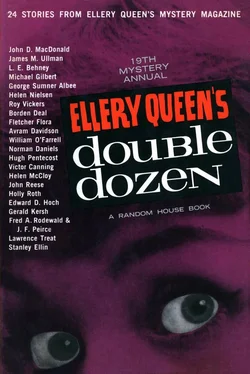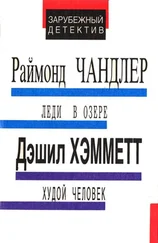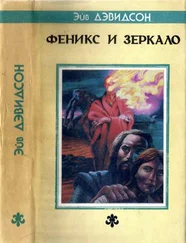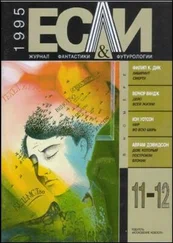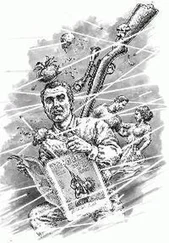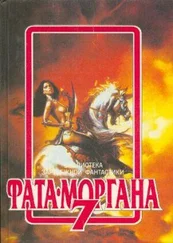“The people. Juan gives him tequila. Others, food and clothing. I tear up his traffic tickets. He has a shack. He calls it a garage. He is happy, but he could be happy without being a station wagon.”
Coughing and sputtering sounds issued from the street outside, then gave way to loud honks and beeps that faded off down the street.
“He is disturbing the siesta again,” Carlos said, shaking his head as Juan returned to the cantina. “I told you to keep him quiet on the street. Now I will have to give him another ticket for honking his horn. It is a terrible horn. It is the loudest horn in all Mexico.”
“Pepe means no harm,” Juan said, “and the people do not care.”
He raised his hand and pulled at his mustache. As he did, a piece of cardboard approximately five inches deep and a foot wide slipped from beneath his “apron” and fell to the floor. The cardboard had numbers and letters penciled heavily across its face. Juan picked it up hurriedly.
“What is that, my friend?” Carlos asked.
Juan looked away. “The license for Pepe,” he said.
Carlos jumped to his feet. “You have no right to give it to him!” he shouted. “It is no license! It is wrong to give it to him!”
“It’s only cardboard,” Mike said. “What’s the harm if it makes the old man happy?”
“It is wrong!” Carlos shouted. “It is not official!”
“ Si. It is not official,” Juan said. “Pepe, too, said it is not official. He would not take it. Only Carlos can make it official. It is a paper license. It cost nothing. But it could make Pepe happy if you gave it to him. Only you can make Pepe official. Carlos, you must! Please, I beg of you.”
Carlos made no reply, and Juan pulled with both hands at his mustache. The two men glared at each other.
“Look,” Mike said, and ran his fingers through his hair, “how about me buying the two of you a drink? I could use a cold beer.”
Juan quit pulling at his mustache and leaned his hands on the bar. “We have beer,” he said, “but it is not cold.”
“Not cold?”
“There is no ice. We have no electricity in Rio Escondido.”
“No electricity? But— You can’t be serious! You don’t have electricity, you don’t have pavement, but you do have parking meters, don’t you?”
“Si.”
“For cat’s sake, why?”
“We are a poor village,” Juan said. “We cannot afford these things. Our government told us that electricity is too expensive; they could not give it to us. They told us they would sell us the meters to make the money to pay for the electricity.”
“But where are the cars?”
Carlos threw up his hands. “We have three — all government vehicles. And they do not pay.”
Mike whistled. “Well, I’ll be damned!” he said. “You’ve been taken — and by some A-one con men. Which reminds me, I need some coins for the meter.”
“No, my friend,” Carlos said, “the meters are forever free to the first to use them. We have waited seven weeks. You are the first.”
“We told the government there were no vehicles,” Juan said, “but they told us if we had meters we would have many touristas . You are the first. The others will soon follow.”
“But this place is nothing! Nowhere! You won’t get any tourists here.”
Juan shrugged. “The government told us.”
Carlos pounded the bar. “Si, the government told you, but the government was wrong. You would not listen to me. You never listen! I, Carlos Rodriguez, told you that it was not so. But you would not listen.”
Coughing and sputtering noises could be heard approaching along the street outside. In front of El Perro Negro they stopped and gave way to loud honks and beeps.
“Pepe needs more gasoline,” Juan said. He reached for the tequila, but Carlos took it from him.
“No,” Carlos said, “Pepe is no station wagon — he is a man. He does not need gasoline — he needs tequila. I will take it to him.”
At the batwings Carlos stopped and turned to Juan. “You are all Pepes in this town. You are children. Foolish children. You believe when Pepe tells you he is a station wagon. And Pepe is no station wagon. You believe when the government tells you there will be rich touristas, that there will be much money if you have parking meters. And there are no touristas. There is no money. Si. You are all Pepes. You have spent your pesetas, and for nothing!”
Carlos strode through the batwings and Mike turned to Juan.
“What’s his story?” Mike asked.
“He is the village conscience.”
“Why isn’t he like the rest?”
“A woman.”
“It figures.”
“He no longer believes. He would not hurt Pepe. But he cannot believe. He is a good man. His heart tells him that Pepe should have the license, but not his head. So he cannot give it to him.”
A stream of high, staccato Spanish exploded like a string of firecrackers outside. Mike could understand none of it — it was hardly high-school Spanish, but it was obvious that Carlos was very angry. It was impossible to hear Pepe’s calm replies.
Then all was quiet — a quiet broken at last by Pepe starting his engine and chugging and sputtering down the street.
Moments later a dirty, half-naked boy entered carrying the tequila.
Mike recognized the boy who had played the bull.
The boy handed Juan the bottle, and the two spoke rapidly, Juan pulling at his mustache.
Mike caught the words “Pepe” and “ cárcel.” The latter word was repeated several times, but he could not recall its meaning.
Juan and the boy finished talking, and Juan fished a coin from his pocket and tossed it to the boy, who once again became a bull. With head lowered and horns pointing outward, he went charging through the cape-like doors.
Juan unfastened the towel from around his middle and turned to Mike, his manner quite serious. “Carlos has taken Pepe to jail.”
“This is something new?”
“ Si. It has never happened before.”
“What will happen?”
“I do not know, but we must help Pepe.” He paused as if realizing it was none of Mike’s affair. “You will help,” he said. It was a statement, not a question.
“Of course. If I can.”
Juan took the cardboard license from behind the bar and stuffed it under his shirt, then hurried outside.
Mike followed him into the street and was again struck by the suddenness of the heat, the brightness of the sun.
Carlos and Pepe were nowhere in sight. All was quiet. It was still the siesta.
Juan led the way along the dusty, unpaved streets till they came at last to a squat, adobe building with Estación de Policia in neat black letters above the door.
They entered a bare, cheerless room containing a desk and two straight-backed chairs.
Carlos glared at them from behind the desk as they entered.
“How is Pepe?” Juan asked.
“He is loco! ” Carlos said, waving his arms. “That is how he is! He is loco, loco, loco! He will not understand he is no station wagon!”
“Maybe he is a station wagon,” Mike said.
“What? You say this? No, my friend, you think as I do. You cannot believe him. He is loco!”
“How do you know Pepe is loco?” Mike asked. “How do you know he is not a station wagon?”
“Because he is no vehicle,” Carlos answered, turning away as if not wanting to discuss it.
“Our friend Juan here,” Mike said, “is he a bartender?”
“Si.”
“Why is he a bartender? What makes him a bartender?”
“He serves tequila.”
“If you come to my home and I serve you tequila, am I a bartender?”
Читать дальше
